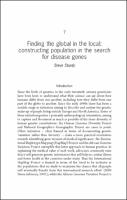Global health and the new world order
Historical and anthropological approaches to a changing regime of governance
| dc.contributor.editor | Gaudillière, Jean-Paul | |
| dc.contributor.editor | Beaudevin, Claire | |
| dc.contributor.editor | Gradmann, Christoph | |
| dc.contributor.editor | Lovell, Anne | |
| dc.contributor.editor | Pordié, Laurent | |
| dc.date.accessioned | 2021-02-10T13:09:48Z | |
| dc.date.available | 2021-02-10T13:09:48Z | |
| dc.date.issued | 2020 | |
| dc.identifier | https://library.oapen.org/handle/20.500.12657/42723 | |
| dc.identifier.uri | https://directory.doabooks.org/handle/20.500.12854/27093 | |
| dc.description.abstract | What does global health stem from, when is it born, how does it relate to the contemporary world order? This book explores the origins of global health, a new regime of health intervention in countries of the global South, born around 1990. It proposes an encompassing view of the transition from international public health to global health, bringing together historians and anthropologists to explore the relationship between knowledge, practices and policies. It aims at interrogating two gaps left by historical and anthropological studies of the governance of health outside Europe and North America. The first is a temporal gap between the historiography of international public health through the 1970s and the numerous anthropological studies of global health in the present. The second originates in problems of scale. Macro-inquiries of institutions and politics, and micro-investigations of local configurations, abound. The book relies on a stronger engagement between history and anthropology, i.e. the harnessing of concepts (circulation, scale, transnationalism) crossing both of them, and on four domains of intervention: tuberculosis, mental health, medical genetics and traditional (Asian) medicines. The volume analyses how the new modes of ‘interventions on the life of others’ recently appeared, why they blur the classical divides between North and South and how they relate to the more general neoliberal turn in politics and economy. The book is meant for academics, students and health professionals interested in new discussions about the transnational circulation of drugs, bugs, therapies, biomedical technologies and people in the context of the ‘neoliberal turn’ in development practices. | |
| dc.language | English | |
| dc.relation.ispartofseries | Social Histories of Medicine | |
| dc.rights | open access | |
| dc.subject.classification | thema EDItEUR::M Medicine and Nursing::MB Medicine: general issues::MBX History of medicine | en_US |
| dc.subject.classification | thema EDItEUR::P Mathematics and Science | en_US |
| dc.subject.classification | thema EDItEUR::J Society and Social Sciences::JP Politics and government::JPS International relations::JPSN International institutions | en_US |
| dc.subject.other | global health | |
| dc.subject.other | knowledge | |
| dc.subject.other | politics | |
| dc.subject.other | history | |
| dc.subject.other | anthropology | |
| dc.subject.other | tuberculosis | |
| dc.subject.other | mental health | |
| dc.subject.other | genetics | |
| dc.subject.other | Asian medicines | |
| dc.title | Global health and the new world order | |
| dc.title.alternative | Historical and anthropological approaches to a changing regime of governance | |
| dc.type | book | |
| oapen.relation.isPublishedBy | bcb4ab08-c525-4e6c-88e5-a0cf0a175533 | |
| oapen.relation.hasChapter | f082f3aa-84e7-4705-8150-78c8c6c45043 | |
| oapen.relation.isbn | 9781526149688 | |
| oapen.pages | 248 | |
| oapen.place.publication | Manchester | |
| dc.dateSubmitted | 2020-10-28T09:16:12Z |
Files in this item
| Files | Size | Format | View |
|---|---|---|---|
|
There are no files associated with this item. |
|||
This item appears in the following Collection(s)
Chapters in this book
-
(2020)Numerous studies describe the genetic make-up of populations living outside Europe and North America. Many of these tackle human genetic variation with the explicit aim of identifying gene variants of medical significance ...

